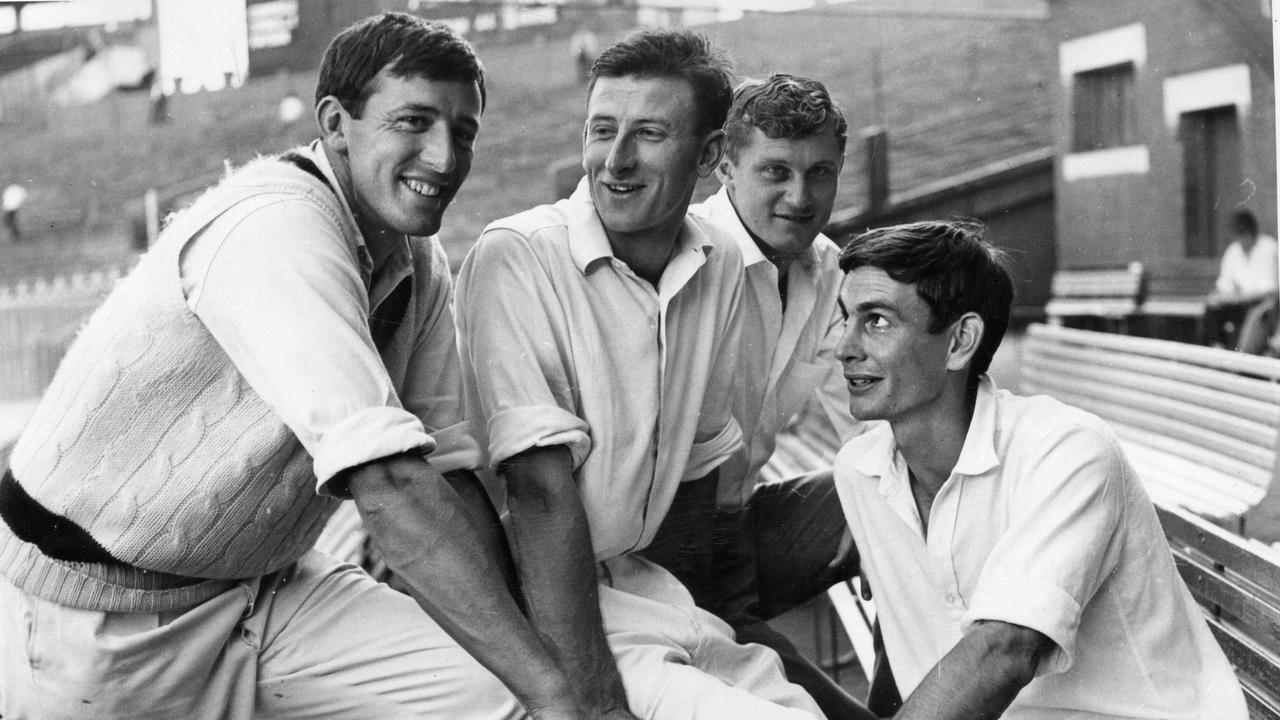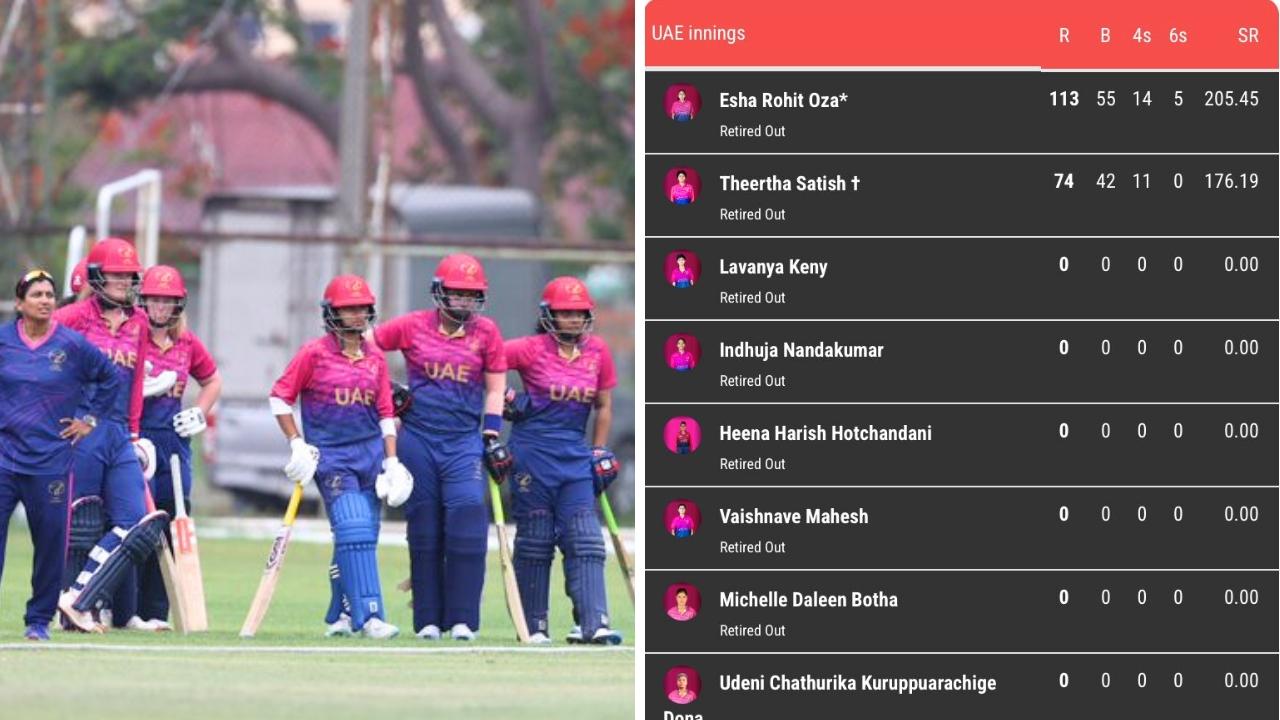Humiliating moment changed everything about Australia’s World Cup campaign
Australia were overlooked as favourites leading into the T20 World Cup, but one defining moment transformed the side into champions.
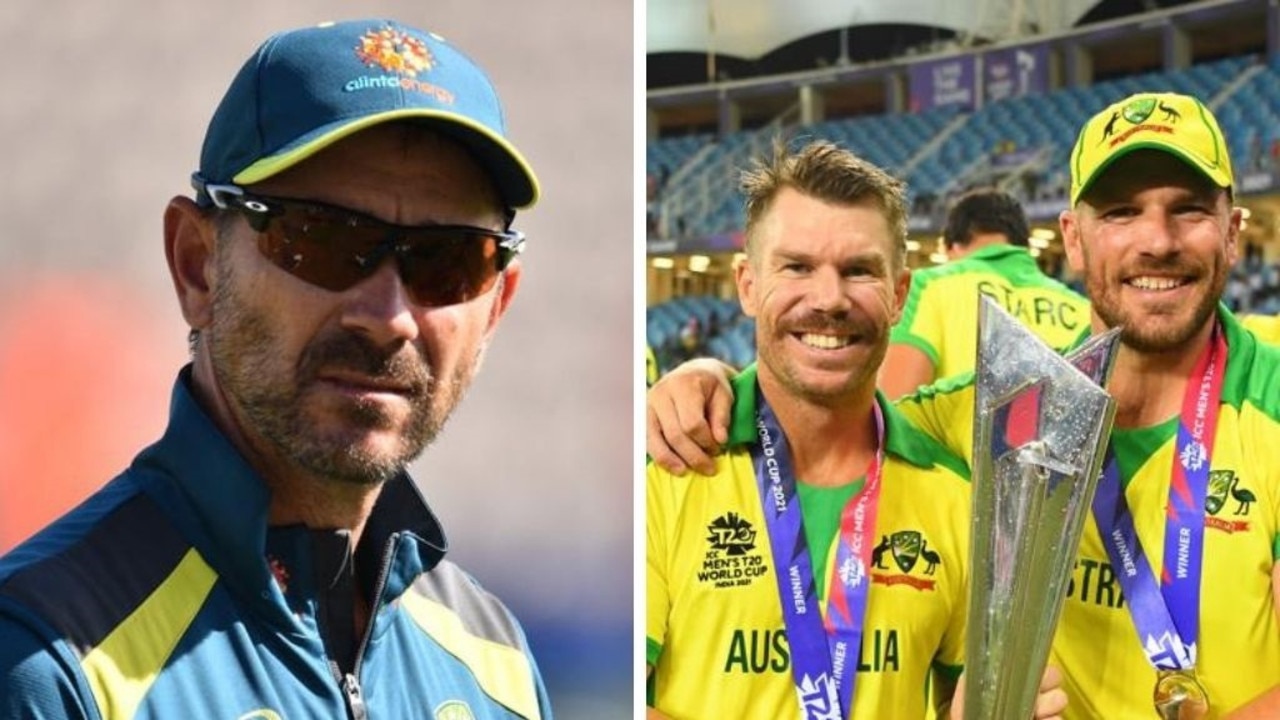
Did anyone honestly believe Australia could win this tournament?
Aaron Finch’s men had lost five consecutive bilateral series leading into the T20 World Cup — their most recent T20 series victory came against South Africa in February 2020, before the coronavirus pandemic.
Miss any of the epic T20 World Cup Final between Australia and New Zealand? Catch up with Kayo Minis. New to Kayo? Start your free trial today.
Before their tournament opener against the Proteas, Australia’s T20 record was 15 losses from 21 matches since March 2020.
The Australians, who had not qualified for a T20 World Cup semi-final since 2012, were ranked No. 7 on the ICC T20 rankings leading into the tournament, and their Super 12 group was branded the “Group of Death”.
There were three former T20 World Cup champions in the group, along with two sides that had embarrassed them 4-1 a few months prior.
Needless to say, the odds were stacked against them.
Yet on Monday morning, Australia defeated trans-Tasman rivals New Zealand to secure a maiden Men’s T20 World Cup title, ending a 14-year hoodoo in the game’s shortest format.
Finch’s troops were far from their best in the final — there were two costly dropped catches and Mitchell Starc’s bowling at the death was woeful. Yet somehow, even when not playing at their finest, the Aussies found a way to get over the line.

England humiliation a defining moment
Speaking to SEN this week, Australian coach Justin Langer was asked what he considered the defining moment of the side’s campaign, and the radio hosts were taken aback by his answer.
“I actually think it was losing to England,” Langer responded.
After securing wins against South Africa and Sri Lanka, the Australians were utterly humiliated by England in their one-sided Super 12 encounter.
The old enemy was not only a class above Australia — they were playing an entirely different brand of cricket.
When Australia lost early wickets in the powerplay, they would slam on the brakes — when England lost early wickets, they accelerated and immediately put pressure back on the bowlers.
English opener Jos Buttler cracked five sixes in an explosive knock of 71, while nobody in Australia’s top six cleared the boundary rope in Dubai that night. Langer realised that for Australia to have any chance of qualifying for the semi-finals, they needed to completely transform their mentality with the bat.
Essentially, they had to imitate the Poms.
“That was quite a sobering experience for us,” he explained. “The game didn’t go to plan. They came out and Jos Buttler just went berserk. It was like, ‘Wow, we’re under the pump here’.
“We watched first hand how we probably needed to play our cricket. We needed to be a bit more fearless, a bit more aggressive.
“We had to get better.”
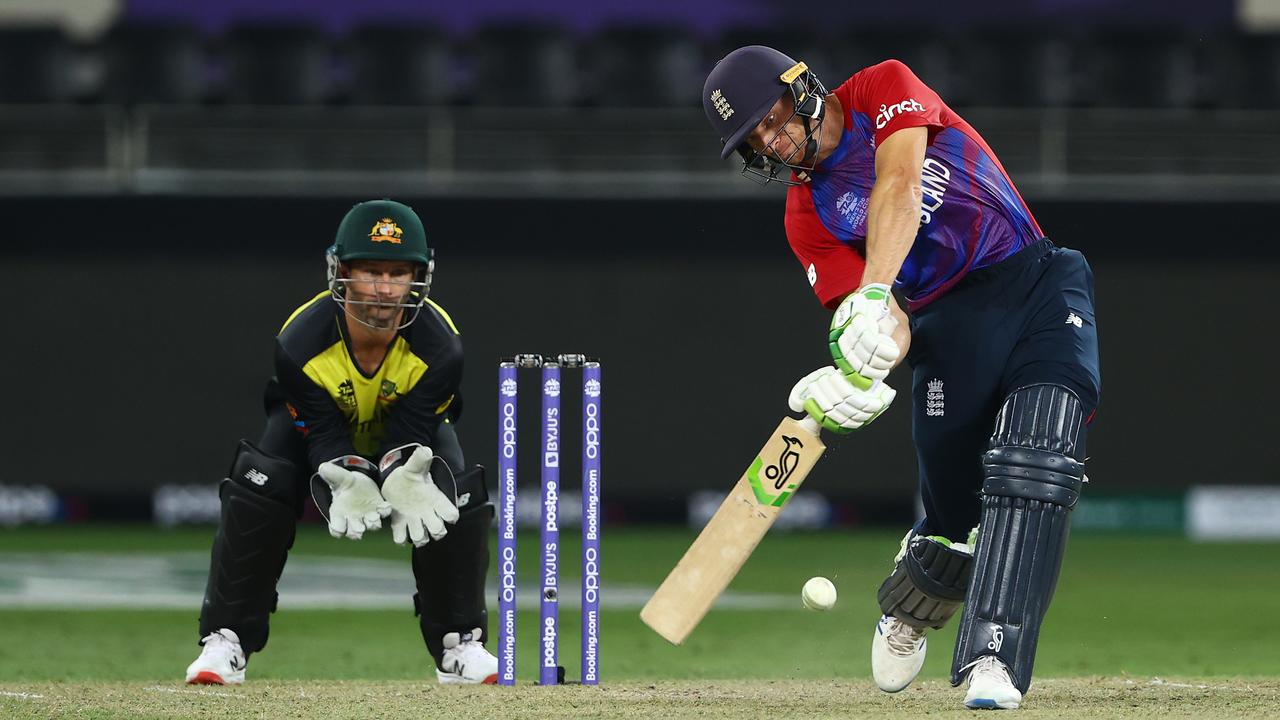
Australian captain Aaron Finch reiterated Langer’s remarks earlier this week: “We felt as though in that game we were probably a little bit timid and got outplayed in the powerplay. It was just about staying really aggressive and understanding this format of the game that when you’re up against a great opposition, they don’t always allow you big opportunities to get into the game.
“We reiterated that was how we wanted to go about it and committed to playing that way.”
Following the eight-wicket loss to England, Australia implemented an entirely new strategy with the bat — fearlessness.
When tasked with chasing a low target against Bangladesh a few days later, Australia’s batters no longer looked for gaps in the ring and pushed for quick twos — they wanted boundaries. Australia reached the 74-run target in 6.2 overs, making it the side’s quickest run chase in T20 history.
“(The Bangladesh chase) was a real blueprint for this tournament, but also into the future for Australia’s white-ball cricket,” Langer told reporters on Friday.
“It was like this light bulb moment for the team — ‘Wow, we could start playing like this, it’s going to be a lot of fun and we’re going to win a lot of games of cricket’.
“That’s what you’d call fearless cricket and if we’re going to win this tournament, we’ve got to continue on with the way we played from Bangladesh.”
The team that belted Bangladesh was unrecognisable to the one that lost to England and that aggressive mentality stayed with Australia for the remainder of its campaign in the UAE.
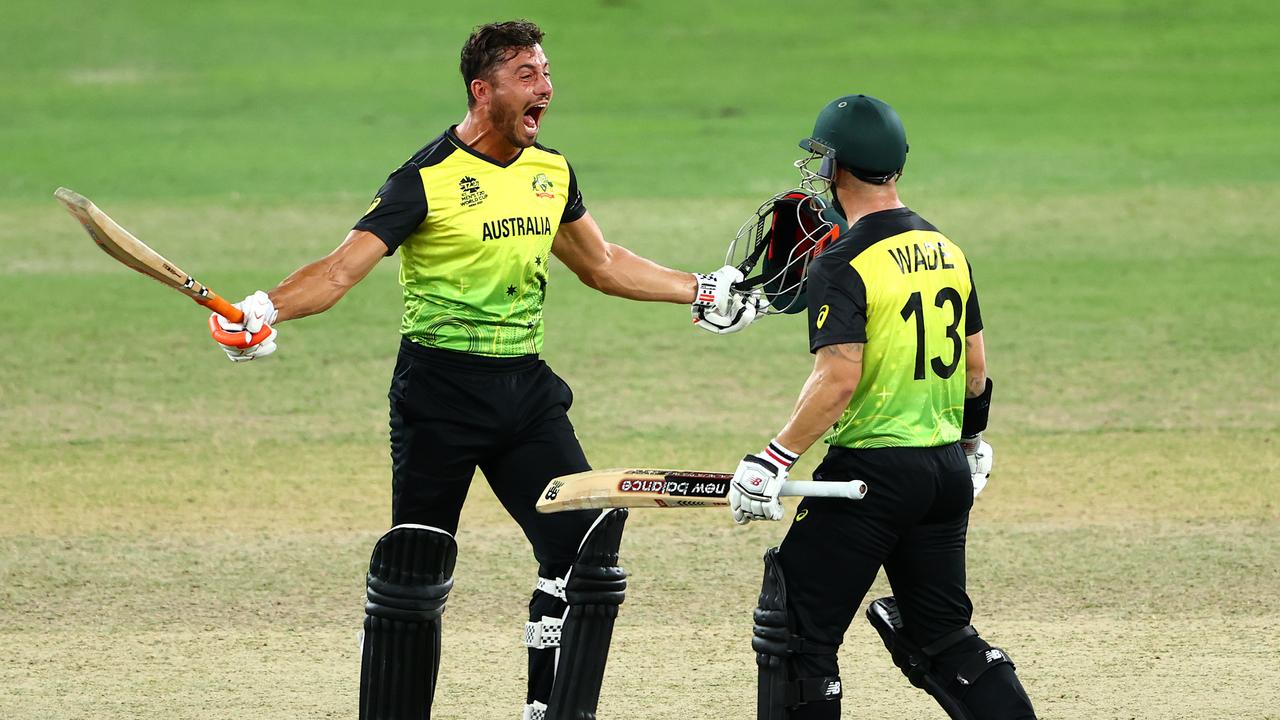
Unlikely heroes come to Australia’s rescue
When Marcus Stoinis waltzed to the crease in the 13th over of the semi-final run chase against Pakistan, Australia required 81 runs from 46 deliveries. The all-rounder knew he didn’t have time for a sighter, so he cleared the front leg and cracked his first delivery over the mid-wicket boundary for six.
“That’s what you call fearless cricket,” Langer said of the moment.
Later, in the penultimate over of the run chase, Pakistan’s Hasan Ali dropped a regulation catch in the outfield to gift Matthew Wade an extra life at the crease. But instead of fretting over his error, Wade nonchalantly scooped the next delivery from paceman Shaheen Afridi over the wicketkeeper’s head for six.
Fearless.
Stoinis and Wade have been the Big Bash League’s most prolific opening batters over the last three years, but are thrown into the middle order when they represent Australia due to an abundance of options at the top.
They were once again thrust into unfamiliar roles for the T20 World Cup campaign — Wade had not batted at No. 7 in a T20 international before this tournament since January 2016. Despite lacking match experience as finishers, the pair took on the challenge and adapted to their new-found roles.
In the World Cup, they collectively averaged 77.00 with the bat at a strike rate of 149.51.
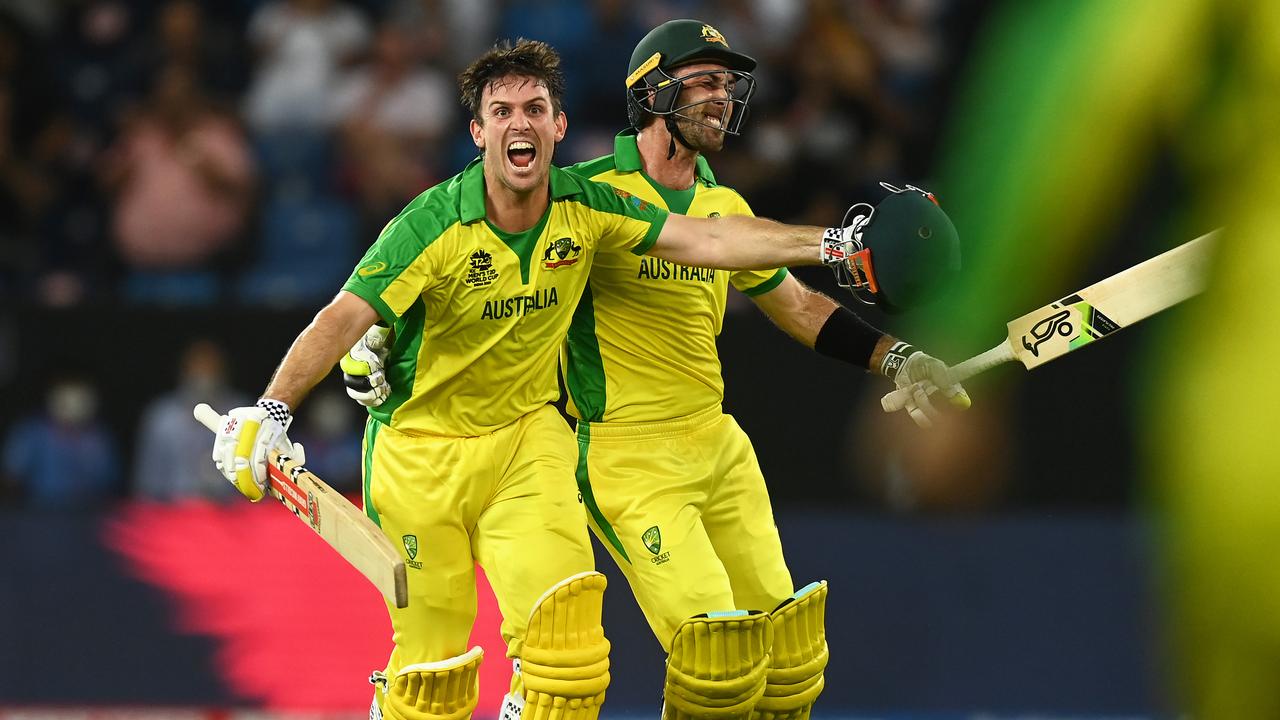
It was also fitting that Mitchell Marsh and Glenn Maxwell were at the crease for Monday morning’s winning moment against New Zealand.
The talented duo have copped a tsunami of criticism for failing to reach their full potential on the international stage. Just two years ago, Marsh sheepishly conceded that most Australian cricket fans hated him.
The West Australian had been axed from the Australian side halfway through the T20 World Cup, screaming into his pillow after Langer informed him of the decision. But since returning to the starting XI, no player has embodied Australia’s blueprint of self-belief better than Marsh.
He smacked his first delivery in the run chase against New Zealand over the square-leg rope for six, then struck back-to-back boundaries for his next two balls.
And Maxwell, who had twice been dismissed attempting the reverse sweep during the tournament, hit the winning runs playing his trademark shot — fully aware he’d be chastised if he didn’t pull it off.
Fearless.
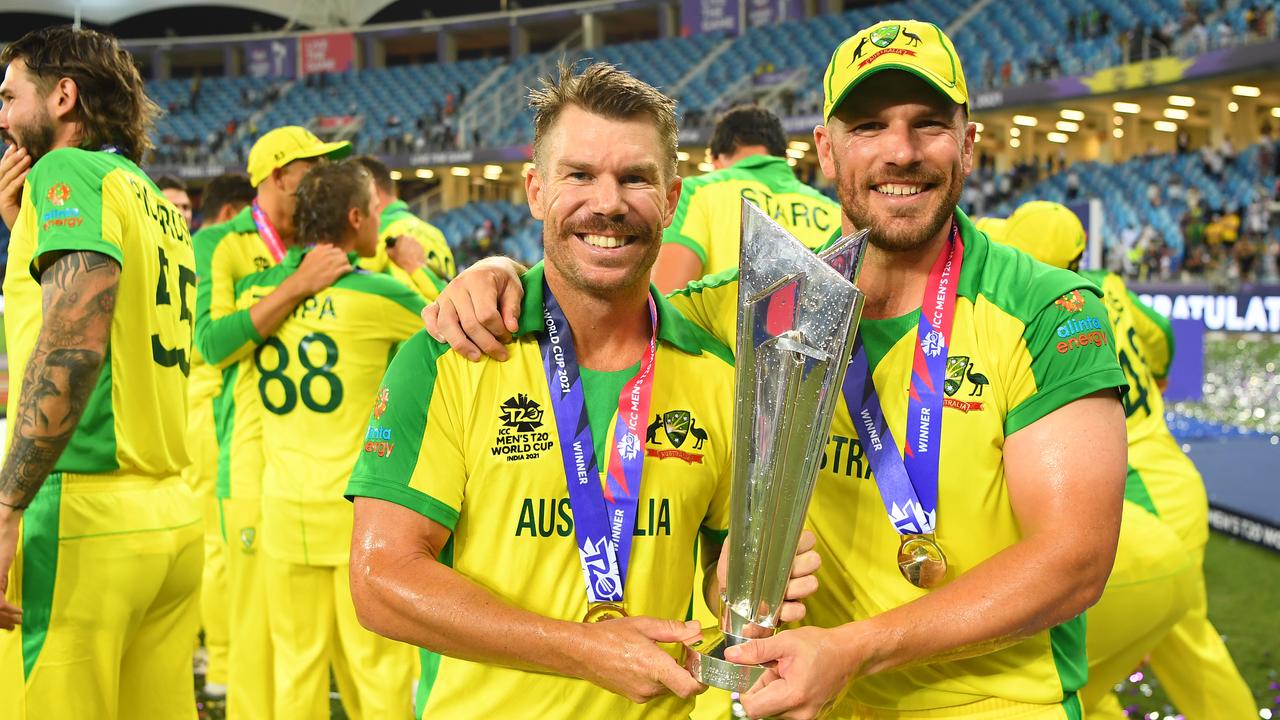
There are fascinating storylines littered throughout the Australia squad. Josh Hazlewood, who was not selected for any T20 internationals between April 2016 and August 2020 or the 2019 Cricket World Cup, has developed into Australia’s most reliable short-format paceman.
The undervalued Adam Zampa leaves the United Arab Emirates with some pundits drawing comparisons to Shane Warne.
Then there’s David Warner, the Player of the Tournament. Last month, the left-hander was axed from his Indian Premier League franchise having already been dumped as captain. After registering scores of 0, 2, 0 and 1 leading into the T20 World Cup, murmurs that Warner was past his prime grew.
But he adamantly told reporters he wasn’t out of form — simply out of runs.
Warner finished the tournament with the most runs by an Australian in a single T20 World Cup — 289 runs in seven knocks at an average of 48.16.
More Coverage
The greats always have a knack of bouncing back.
“Warner’s last two weeks have been amazing,” Australian teammate Steve Smith said.
“A lot of people were writing him off. He came in with exceptional intent and took the game away at the start.”




